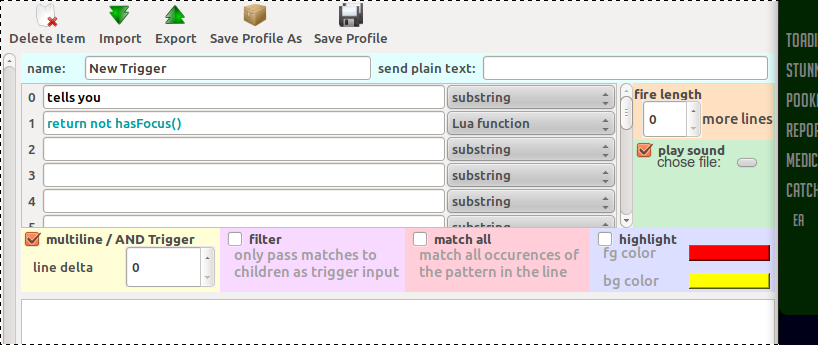

- Mudlet string functions how to#
- Mudlet string functions install#
- Mudlet string functions full#
- Mudlet string functions code#
Now, say you want to make an trigger that echoes something back. The ` mark is done with (shift + ´) (above enter button in my keyboard) and then press space so it wont end up on top of the following letter. You can test triggers by using built-in echo system (image 4), used by
Mudlet string functions code#
then Save item, make sure it is activated (again like in keybinding), and you are done!Īll code goes in the big white box below pattern and trigger type, when creating a trigger in mudlet. For our purposes we selected "Start of line" (image 3), so it will trigger only when the message appears in the start of a line.Īfter this, we click "highlight" box on lower right side, and select colours for background and foreground (background will be ON what color the text will be written, and foreground Say you want to highlight a message for when Power of Earth buff ends on you.įirst you get the message for it, paste it to a new trigger you added by clicking "add item" (just like in making a keybind), and then you must select what type of type Mudlet triggers have many options to choose from when making one (image 5). you will want a green check-mark to appear next to they key on the list (image 2). If you're working on coding Mudlet itself, use this function to tell where the actual definition of a function is.Click the "keys" button on toolbar (image 1), then click "add item", name the key, define a command the key will send once pressed (like "up", "dig grave" etc)., then on the right side of "key binding" there is "Grab new key" button.Ĭlick it, then press the button you wish to bind, then press "save item", and then "activate". You can also use it to get more information on the Alias# / Trigger# objects you see in the error console: Lua brings a helpful debug.getinfo(function) function, which gets you some information about where a function comes from: whenever it's your own, or one defined by Mudlet (in C++ or Lua). Newer ones that do support them are completely fine, however!Ĭoroutines have many uses: finite state machines, running intensive tasks (yielding every once in a while so Mudlet isn't frozen), and so on. Older Mudlets that don't support coroutines might crash, which sucks. Note that if you'll be using coroutines as part of a package you'll give to others, remember about the if mudlet.supportscoroutines then return end bit.
Mudlet string functions install#
You can also install the demo as a package - paste this into Mudlet: You'll see that the send()'s are being sent one at a time, instead of all at once as they would have been without the yields. create a coroutine that'll be running our ritual function - or re-use the one we're already using if there is one ritualcoroutine = ritualcoroutine or coroutine.create ( ritual ) - run the coroutine until a coroutine.yield() and see - if there's any more code to run local moretocome = coroutine.resume ( ritualcoroutine ) - if there's no more code to run - remove the coroutine, - so next time you call the alias - a new one gets made if not moretocome then ritualcoroutine = nil end This is stored in multimatches as the value of key=1 in the sub-table matches which, in turn, is the value of key=1 of the table multimatches.
Mudlet string functions full#
The first trigger condition (=regex 1) got as the first full match "You have not completed any quests".


You can now see what the table multimatches contains in this case. The function showMultimatches() prints out the content of the table multimatches. The table multimatches contains : - regex 1 captured : ( multimatches ) key = 1 value = You have not completed any quests key = 2 value = not key = 3 value = completed key = 4 value = any key = 5 value = quests regex 2 captured : ( multimatches ) key = 1 value = You are refreshed, hungry, very young and brave key = 2 value = refreshed key = 3 value = young key = 4 value = and key = 5 value = brave. You are refreshed, hungry, very young and brave. You have an almost non-existent ability for avoiding hits. The command "score" generates the following output on batMUD: In the case of a multiline trigger with these 2 Perl regex as conditions: The following example can be tested on the game : multimatches stores its matches by lines, inside each line are the relevant matches to it. Multimatches is the complement of matches when matching multi-line triggers.
Mudlet string functions how to#
Nick Gammon has also written a nice overview on how to deal with Lua tables. A good overview of tables is available on Lua's wiki in the TablesTutorial.


 0 kommentar(er)
0 kommentar(er)
